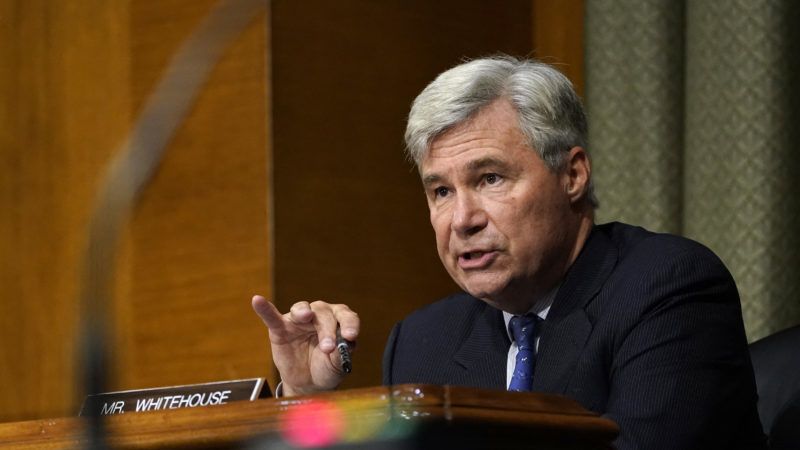Alito Rightly Slams Five Democratic Senators for 'Bullying' the Supreme Court
The senators warned that the Court might have to be "restructured" if it did not reach the conclusion they preferred in a Second Amendment case.

In an eyebrow-raising 2019 brief, five Democratic senators warned that the Supreme Court might have to be "restructured" if it failed to reach the conclusion they preferred in a Second Amendment case. Justice Samuel Alito recalled that episode during his Federalist Society speech last night, saying the senators had engaged in blatant "bullying" by issuing "a crude threat" aimed at undermining judicial independence.
Alito is right. The case involved New York City's uniquely onerous restrictions on the transportation of firearms, and the senators—Sheldon Whitehouse (D–R.I.), Mazie Hirono (D–Hawaii), Richard Blumenthal (D–Conn.), Dick Durbin (D–Ill.), and Kirsten Gillibrand (D–N.Y.)—wanted the justices to decide (as they ultimately did) that mid-litigation revisions to those rules made the case moot. But instead of simply presenting legal arguments in favor of that outcome, Whitehouse et al. launched an attack on the Court's integrity, accusing the justices of perverting the law to protect "interests important to the big funders, corporate influencers, and political base of the Republican Party." The evidence they presented consisted of cases in which the Court had reached conclusions they did not like.
"The Supreme Court is not well," the senators concluded. "And the people know it. Perhaps the Court can heal itself before the public demands it be 'restructured in order to reduce the influence of politics.' Particularly on the urgent issue of gun control, a nation desperately needs it to heal."
Alito said he was concerned about the appearance created by that threat. "After receiving this warning," he said, "the Court did exactly what the city and the senators wanted. It held that the case was moot, and it said nothing about the Second Amendment. Three of us protested, but to no avail." Although "I'm not suggesting that the Court's decision was influenced by the senators' threat," he added, "I am concerned that the outcome might be viewed that way by the senators and others with thoughts of bullying the Court. This little episode, I'm afraid, may provide a foretaste of what the Supreme Court will face in the future, and therefore I don't think it can simply be brushed aside."
The senators' brief "was an affront to the Constitution and the rule of law," Alito said. "The Supreme Court was created by the Constitution, not by Congress. Under the Constitution, we exercise the judicial power of the United States. Congress has no right to interfere with that work any more than we have the right to legislate. Our obligation is to decide cases based on the law, period. And it is therefore wrong for anybody, including members of Congress, to try to influence our decisions by anything other than legal argumentation. That sort of thing has often happened in countries governed by power, not law."
Senate Minority Leader Chuck Schumer (D–N.Y.) did not join that bullying brief. But during a pro-choice rally in March, Schumer turned toward the Supreme Court building and declared: "I want to tell you, Gorsuch, I want to tell you, Kavanaugh, you have released the whirlwind, and you will pay the price! You won't know what hit you if you go forward with these awful decisions."
Schumer at least had the excuse that he got carried away in the heat of the moment (although his spokesman offered a different, wildly implausible excuse, claiming his boss was referring to "the political price Senate Republicans will pay for putting these justices on the court"). Whitehouse et al., by contrast, issued their threat in writing and submitted it as part of a Supreme Court brief, allowing plenty of time for calm reflection.
Democrats have rightly faulted President Donald Trump for undermining judicial independence by casting doubt on the legitimacy of decisions he does not like. Incidents like these suggest they are prepared to defend that principle only when it's politically convenient.


Show Comments (140)